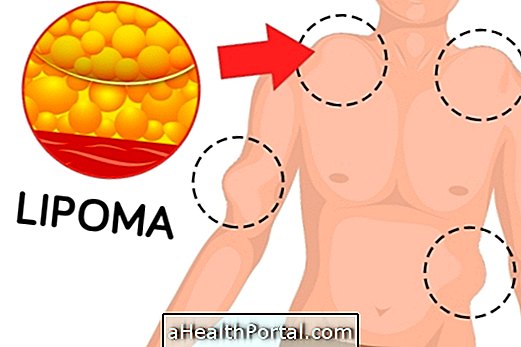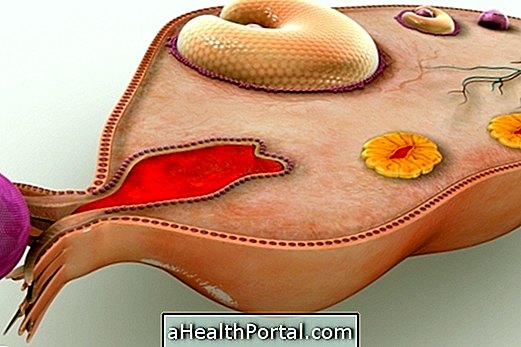The swollen neck can happen due to flu, cold or infections in the throat or ear, for example, which leads to enlargement of the lymph nodes present in the neck. Usually the swollen neck is easily solved, but when accompanied by other symptoms such as fever, pain in the lymph nodes when touched or loss or gain of weight without apparent cause, can be indicative of more serious situations, with cancer and Cushing's Syndrome, for example.
Therefore, it is important to observe the progression of the swelling, and should go to the doctor when the swelling lasts for more than 3 days or already appear accompanied by other symptoms. Thus, the doctor can perform tests that can identify the cause of the swelling and start the treatment.

Main causes
1. Lymph node enlargement
Lymph nodes, also known as lymph nodes or gullet, are small glands that can be found scattered around the body, being more concentrated in the groin, armpits and neck, and whose function is to allow the immune system to function properly and, consequently, to be responsible for combating infections.
The enlargement of the lymph nodes is usually indicative of infections or inflammation, and it is possible to notice a slightly swollen neck, for example. Thus, swelling of the neck due to enlarged lymph nodes may be indicative of colds, flu and throat inflammation, for example. Know the main causes of lymph node enlargement.
What to do: If it is noticed that lymph nodes increase over time, they do or other symptoms such as persistent fever appear, for example, it is important to go to the doctor to investigate the cause of enlarged lymph nodes.
2. Thyroid problems
Some changes in the thyroid lead to swelling of the neck, especially goiter, which is characterized by enlargement of the thyroid gland in an attempt to compensate for the production of thyroid hormones due to hypo or hyperthyroidism, for example. Learn about other thyroid-related diseases.
What to do: If thyroid problems are suspected, it is important to go to the endocrinologist for imaging and laboratory tests to confirm the diagnosis. The treatment is done according to the cause of the goiter, it can be done through the administration of iodine or hormone replacement, for example. Know what is goiter, symptoms and how the treatment is done.
3. Lightning
Mumps, also known as mumps, is an infectious disease caused by a virus that lodges in the salivary glands, promoting the swelling of the face and, mainly, of the side of the neck. Know the symptoms of mumps.
What to do: The best way to prevent mumps is by administering the MMR vaccine, which should be done as early as the first year of life and protects against mumps, measles and rubella. However, if the child has not been vaccinated, it is important to disinfect objects contaminated with throat, mouth and nose secretions and to avoid the child's contact with other people who may have the disease.
The treatment of mumps is done with the aim of relieving symptoms, and resting and the use of medicines to relieve discomfort, such as Paracetamol or Ibuprofen, for example, are recommended. Learn how mumps treatment is done.

4. Cancer
Some cancers, especially lymph nodes, can lead to enlarged lymph nodes, leaving the neck swollen. In addition to swelling of the lymph nodes, there may be weight loss with no apparent cause, malaise, and frequent tiredness. It is important to go to the doctor for tests and the diagnosis can be made. Learn more about lymphatic cancer.
What to do: If there is suspicion of lymphatic cancer, the doctor may order several tests, especially blood count, tomography and biopsy, for example. The treatment of lymphatic cancer is done according to the degree of impairment of the lymphatic system, and can be done with chemotherapy or radiotherapy. Understand how lymphatic cancer is treated.
5. Cushing's syndrome
Cushing's syndrome is an endocrine disorder characterized by increased concentration of cortisol in the blood, which causes a rapid increase in weight and accumulation of fat in the abdominal region and the face, which makes the neck swollen, for example. The diagnosis of this syndrome is made by the endocrinologist through blood and urine tests, in which a high concentration of the hormone cortisol is verified. Understand what Cushing's Syndrome is and what causes it.
What to do: If sudden weight gain is noticed, for example, it is important to go to the general practitioner or endocrinologist to have the diagnosis made, and then the treatment is started. The treatment varies according to the cause of the disease: in the case of prolonged use of corticosteroids, for example, the recommendation is to suspend the medication, but if the disease is the result of a tumor in the pituitary, for example, it may be indicated by the doctor performing surgery to remove the tumor, in addition to chemo or radiotherapy.
When to go to the doctor
It is important to go to the doctor when the neck swelling lasts for more than 3 days and other symptoms appear, for example persistent fever, excessive tiredness, night sweats and weight loss without an apparent cause, for example. In addition, if it is noticed that lymph nodes are enlarged and they hurt when they are touched, it is recommended to seek medical advice so that examinations can be performed to identify the cause.





















